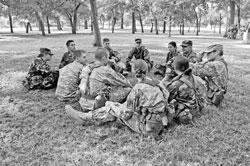It is 0600 hours. The moon is still beaming high in the sky and the streets are eerily quiet. The only light illuminating the field is the low orange light from the flashlights the four supervisors are holding.While the rest of the campus population sleeps, 15 cadets, all of them seniors, stand in a corner of the TCU track field, some on their hands doing push-ups, others encouraging them on.
They are dressed in matching gray shirts with the ARMY
written on them, navy shorts and reflective belts. After their push-ups, they lie on their backs to do sit-ups. The physical fitness test consists of push-ups, sit-ups and a two-mile run.
This routine is a regular scene for those enrolled in the ROTC program at TCU. The physical fitness test is taken every month to ensure their physical capability for being in the Army.
And more and more students will be on the field before sunrise this year. The TCU ROTC program has doubled in the past three years, going from a total enrollment of 65 in 2004 to 140 cadets this year. TCU welcomed 54 freshmen cadets this fall.
“We were shooting for 50 cadets,” Lt. Col. John Agor said. “We did well.”
The growth rate of the purple battalion is an anomaly, Agor said.
Maj. Eddie Smith said the growth can be attributed to stronger advertisement and stronger recruitment.
Agor said recruitment is about getting the word out.
“Our cadets are the best recruiters,” Agor said. “They stick together and people see that, and they want to be a part of it.”
Although the war in Iraq is still ongoing, Smith said the cadets who enroll in the program can’t be deployed by the government to fight in a war until they have a degree and have gone through
training after graduation.
“It’ll usually be five years before they can be deployable,” Smith said. “Who knows where we’ll be in five years?”
The ROTC cadets’ first priority is to get a degree, Smith said.
“They’re at school training to be a leader,” he said.
One way cadets train is by taking an ROTC class every semester completing a total of 26 hours for graduation, Agor said.
When a cadet becomes a junior, he or she will start receiving missions to lead freshmen and sophomores from one area to another. It is simulated to put him or her in a stressful situation, said Stephanie Messinger, senior history major.
“They’re supposed to plan how to get them out,” Messinger said. “The seniors supervise how it goes.”
Other missions for leadership training include leading physical fitness tests for freshmen and mentoring first-year students grouped in squads. Agor said there are about 14 cadets in each squad with two seniors as mentors.
“It sounds like a cliche, but honestly, it is the best leadership program in the nation,” Snider said.
Although ROTC’s goal is to educate and train leaders, there’s always a chance of being sent to fight, Smith said.
Lt. Will Thomas, TCU alumnus, said cadets have to be ready for anything.
“We’re a country at war,” Thomas said. “There’s always a higher chance of deployment when that happens.”
Sara Snider, senior cadet, said her class was told they would most likely be the last to get deployed to Iraq.
“You know coming into the program that there’s something along the lines of being deployed if you join the Army,” Snider said.
Snider, an international communication major, said upon graduation she’ll be working in the human resources in the Adjunct General Corps.
Her situation is common. One of the benefits the ROTC provides cadets is a job upon graduation. Cadets in their junior year compile assessment packets to be ranked in the Order of Merit list.
The Order of Merit list, Agor said, is a list that compiles all the graduating ROTC cadets in the nation according to their physical performance, involvement in extracurriculars and academics.
In the packet, the cadets include what division and branch they want to work for, their extracurricular activities, GPA and physical fitness test scores. The cadets can choose to go into active duty, the National Guard or the Reserves.
The list helps the Army decide in which branch to place a cadet. The top 10 percent of cadets on the list are guaranteed to get into the division and branch they want, Snider said.
“More people want to go into active duty. They had to force 478 cadets to go Reserves this year,” Snider said.
Smith said the reason for going into active duty might be the health benefits – they get full-coverage health insurance – but for others it may be just that they want to be in the Army all the time.
Messinger is going into active duty. She’ll find out at which branch Oct. 26; she said she hopes to go into the Medical Service Corps.
For Messinger, ROTC allowed her to bond with fellow cadets.
“I have good friends,” she said. “Instead of going Greek, I went ROTC.”
While incentives to join the Army differ from person to person, the financial benefit is hard to ignore, Agor said. If a student receives a four-year scholarship, the total averages to about $144,000. Along with a paid tuition, cadets in the program who are on scholarship are given a monthly stipend.
Smith said the stipends are to keep the students free of financial worry. A freshman cadet receives $300, a sophomore $350, a junior $450 and a senior $550. Along with this stipend, cadets are given $900 a year for textbooks.
Some, like Snider, join for leadership, others to help people. Jace Taylor, a freshman electrical engineering major, was born on a military base and has lived on one for half of his life. After graduating from a Department of Defense-run high school in Japan, Taylor came to TCU on a four-year ROTC scholarship.
With both parents in the military, Taylor said he wanted to see for himself how things were on the inside.
“I’ve always been the civilian,” Taylor said. “But now I get to wear the uniform and it feels cool. I kind of feel like my dad.”
Serving the country for ROTC cadets can mean more than fighting in a war.
“I really like the idea of serving my country,” Taylor said. “It’s the fact that I’m doing something for more than myself. I really like helping people, people you don’t even know.”
Agor said ROTC is often confused for Army enlistment.
“Cadets are at TCU to study,” Agor said. “They go into a career upon graduation. They can go to medical school, law school – whatever they want,” Agor said.
Thomas, who graduated in May with a degree in political science and minors in Spanish and history, said he would recommend the ROTC program to anyone. After stumbling upon TCU on a trip to Fort Worth, Thomas said being in the Army is beneficial because it teaches cadets hands on leadership while also bringing in the critical thinking aspect.
Agor said Thomas gives the TCU ROTC program a reason to boast. Thomas was No. 22 out of 4,000 senior ROTC cadets in the nation, according to last year’s Order of Merit list. In his senior year, Thomas earned the political science Distinguished Senior of the Year award.
“Our goal is to have our cadets be well-respected members in the TCU program,” Agor said.
Thomas said he graduated with a cumulative GPA of 4.0
“I got a 4.0 my first semester here,” Thomas said. “It was kind of a game to see how long I could keep it.”
After graduation, Thomas started working at TCU as an ROTC recruiter for the summer. He moved to Camp Mabry on Sept. 30 to move in with his wife who is stationed in Fort Hood. Thomas and his wife have been married for about three months, seeing each other only on the weekends.
Although the couple is finally moving in together, they still have a chance of being separated further. Thomas chose to be in the National Guard aviation branch while his wife chose to go into active duty into the Medical Service Corps. Thomas said he hopes to go to Baylor Law School next spring or summer to go into litigation.
“Being in the Army is worth it for me,” Thomas said. “I loved my time at college. I don’t think the Army asks that much from you. You only give a couple years of your life.”
Many, including Taylor, agree with Thomas that the ROTC program is beneficial.
“It’s really a good deal,” Taylor said. “I get to train for something I want to do while getting paid.





